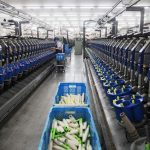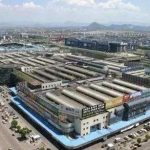▶︎ In Brief: China Textile City, the world’s largest textile hub in Keqiao, China, hosts over 16,000 shops and 10,000 trading firms. With strong exports to the Middle East and Africa, it champions full supply chain integration and growing interest in sustainable textiles.
Interview with Mr Jun Han – Secretary-General at China Textile City / By: Behnam Ghasemi, Editor in chief Kohan Textile Journal
Please let us know more details about China Textile City, history and success story.
China textile city is not a company. It is a physical shopping market and a city. Founded in 1988, located in Keqiao, Shaoxing City, Zhejiang Province, China. Now China Textile City has 16000 textile shops, and 10000 textile trading companies. It has been the largest textile hub in China since its establishment. And now the largest textile hub in the world. The sales turnover of 2019 is 120 billion RMB (17 billion USD).
How many textile producers do you have in China Textile City? In which sectors?
Weaving and knitting: over 1000 mills
Dyeing and printing: over 1000 mills
Other: dyeing material, yarn producers: over 100
How do you evaluate the textile industry after the pandemic period?
The textile business will never die because people need to wear clothing. The sustainability textile has been more accepted by customers, but I personally think, the cheap items will be more popular. The spending power of the customer will be less because of increasing global unemployment during the pandemic. Some countries will still outsource from main suppliers like China and Turkey. While some countries such as THE US will start promoting their own industry, which is a threat to global sourcing.
How do you evaluate the textile and fashion industry in the Middle East and Africa?
Africa and the Middle east are as always big markets for China Textile City. We export a lot to these places. Yes, the turnovers will continue to grow for sure. For example, there are like 2000 people from the middle east are living in China textile city for textile business. Many of them have stayed here for like 15 years.
What are the benefits for textile factories located in China textile city?
Good questions. The cost is higher, but we have the excellent infrastructure in the world, a completely whole supply chain from yarn to fabrics producing, and others like packaging, inspecting, warehousing, selling and logistics.
China government support was a lot before, but now less and less. Tax rebate for export and subsidies to international fairs are the only two friendly things left.
Is there any policy in china to close and limit small textile manufacturers and make a joint venture mega factories? What are the benefits and advantages?
This is not actually happening, but China government is closing the illegal and polluted mills and pushing dyeing and finishing mills to fixed areas. For private business, many choose to merge yes, because that can share risk and share infrastructure like gas and water processing facilities.
COVID 19 shows us we should rely more on sustainability and green products, how we can improve sustainability in the fashion and textile industry? Do you have any plan in China textile city members for producing sustainable products?
As I mentioned, yes the sustainability and green products are betting popular these years. Will this trend remain after pandemic? I personality doubt. Customer has to balance being ethical or cheap cost.
China textile city has many producers producing sustainable products now. Most of them are using for example recycled yarns made from plastic bottles. There is also a saying that the final buyers global brands only care of some documents which can show their stakeholders…










































